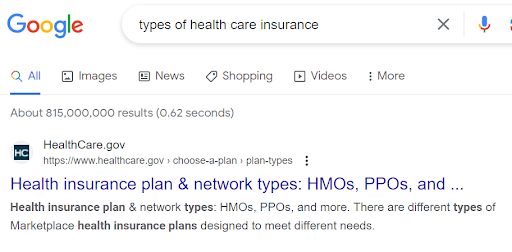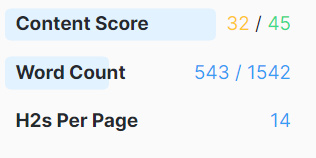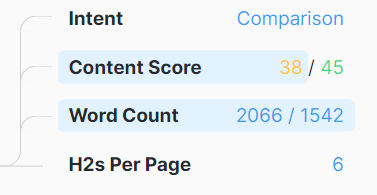Things at your health insurance company are… fine, you suppose. You have a sizable lineup of clients. You can’t please everyone, so some leave before more inevitably come in to replace them. Your team designed a website, but you have to admit it’s not getting as many visitors as you’d like. The lack of valuable content might affect your marketing efforts more than you realize.
Your team of leaders explains to you that health insurance companies like yours need to do more to get noticed. You need a presence on the internet and on social media platforms. You need a content marketing agency that specializes in healthcare content marketing.
As you look out your office window, hands folded behind your back, you ever-so-slightly turn your head.
“Get Brafton on the phone.”
The Importance of Content Marketing for Today’s Health Insurers
If you want to get your business known online, digital marketing is virtually a must. So what is it, and why should health insurers give it the time of day? The healthcare industry is increasingly competitive, and standing out requires a strategic approach to healthcare marketing.
Content marketing is a form of digital marketing and an indirect form of advertising. Instead of using radio jingles or TV spots, it generates interest in your business by taking advantage of various styles of marketing while always keeping search engine optimization (SEO) in mind. This approach is essential for healthcare organizations aiming to connect with healthcare professionals and patients alike.
Let’s look at some common types of content marketing your health insurance company can use:
Blogs
Blogs might be the bread-and-butter of content marketing. These are often educational in nature, explaining a relevant subject before wrapping it up with a call to action (CTA). The goal here is to make your brand an authority on subjects relevant to your field. Put out enough interesting blogs and you’re on your way to being relied upon for information, which in turn boosts your brand recognition. Above all, it gets people to trust you.
Blogs for your company might include information about the different types of health insurance and which one is best for whom. They might be about how to do desk yoga if you’re after the work-from-home types. Maybe your blogs can lay out options for senior health care insurance, such as Medicare Advantage plans. Really, anything is in play as long as it’s at least tangentially related to your brand. No need to pigeonhole yourself — whatever you want to be seen as an authority in, go for it (and don’t be afraid to get creative).
Blogs work in part because nothing turns off a reader like a sales pitch mingling with their search for unbiased information. People are naturally averse to advertising, so earning their trust without sounding like an ad can ultimately be what gets them to convert to your brand. Quality content that provides health information can position your company as a trusted healthcare provider.
Landing Pages
A landing page markets a product or service directly, laying out all its features, benefits and reasons why people should use it. Landing pages are often to the point and don’t preamble much before launching into the heart of things. In contrast to blogs, they’re not really educational as much as promotional. They are crucial for highlighting your health insurance plans and capturing leads from interested visitors.
White Papers
If you want to explain something in great detail, you may want to write a white paper. These are often for B2B purposes after a client has already shown interest in a product or service. Their purpose is to go into depth about how your business’s offering works and why someone should invest in it. As you might expect, white papers can be quite lengthy, with many being thousands or even tens of thousands of words long. They are valuable content pieces that showcase your expertise in the healthcare industry.
eBooks
The term “eBook” means something a little bit different in digital marketing than it does for your J.R.R. Tolkien collection. It’s still an electronic book, but marketing eBooks can include a number of topics about their products. For example, you might explain how your product or service solves a specific problem. eBooks are often, though not always, visual-heavy, with lots of infographics, charts and attractive page designs. They’re normally long-form, though not as much as white papers.
Social Media
Social media is a place to catch your target audience’s attention and lead them to another piece of content, like a blog or landing page. Really talented social media specialists know how to get someone to take a break scrolling through their feed long enough to see the post, become interested and stop what they’re doing to click the provided link. Platforms like Facebook, X and LinkedIn can amplify your healthcare content marketing efforts.
These are just some of the different types of content marketing you can use to get people enrolling in your plans. Incorporating healthcare content into your marketing strategy can make a significant difference in reaching potential clients.
Content Marketing Strategies All Share a Few Common Goals
The intricacies of one health insurance marketing strategy can differ from the next, but they all have a few things in common. With a well-planned and executed strategy, you can:
- Increase brand recognition: The first step in a good content marketing strategy is to get your name out there and in people’s heads. Building a strong healthcare brand sets you apart in the healthcare industry.
- Earn more potential customers: The end goal is to bring in business. Effective content creation attracts individuals seeking health information and solutions.
- Keep your existing patients: Even if you bring in new patients, it’s not much good if they don’t stay. Providing valuable content keeps them engaged and loyal.
- Improve patient experiences: Patients will feel more appreciated if you engage with them. Personalized email marketing and targeted content ideas enhance their interaction with your brand.
What’s SEO?
Earlier, we used the term search engine optimization (SEO). Content marketing agencies that write blogs and landing pages are very into SEO, for a pretty simple reason: It makes your pages more visible on search engine result pages (SERPs). Utilizing SEO services ensures your healthcare content reaches the right audience.
Just think about how people looking for a health care insurance agency go about it. Many go straight to search engines such as Google with queries like, “What’s the best health care insurance?” and “What are the different types of health care insurance?” They are seeking health content that answers their questions.
As soon as they hit the Enter key, the effects of SEO determine which results show up at the top of the page. The most relevant pages with the best SEO are at the top. This is where a robust healthcare content marketing strategy makes a difference.
It’s the job of the content marketing agency to put you there. By optimizing your content marketing efforts, they ensure your healthcare company stands out among competitors.
The Anatomy of a Great Piece of Health Insurance Content
Let’s talk about what effective health insurance content looks like, starting with a blog. First, you and the content marketers come up with a plan. This includes answering questions like:
What Are Our Goals With This Piece?
Nothing can get done without first establishing goals. Another way of phrasing this is, “What do we want to accomplish with this piece of content?” Setting clear objectives guides your marketing efforts effectively.
We said before that the purpose of blogs is usually to boost brand authority with educational content, so let’s say that’s what you want to do. If you have another goal, such as, “Offer the target audience reasons to enroll,” then you’d probably be making a landing page instead. This aligns with your content marketing strategy to attract potential clients.
What Should the Blog Be About?
Following your goal, your blog should be about something relevant to the health care insurance industry. That’s a pretty broad field, so your options are many. You can determine the answer to this question by phrasing it more specifically: “What do we want to be seen as a leading authority in?” The answer could be something general like health care insurance, but that probably wouldn’t make for a very effective blog. Instead, it’s best to diversify and cover all the topics that make up health care insurance marketing.
For the sake of argument, let’s say the topic you decide on is, “The different types of health care insurance.” This topic provides valuable information that your target audience is actively seeking.
What Keyword Do We Want To Rank For?
Now that you have a topic, we can tweak it a bit depending on the keyword we’re aiming for. Keywords and keyphrases are the words someone types into the search bar looking for answers. Selecting the right keywords is crucial for your healthcare content strategy.
This is when the content marketing agency gets the SEO keyword research team involved. In a nutshell, their job is to find a relevant keyword that’s reasonably easy to rank for. Let’s type “types of health care insurance” into Google and see what comes up.

A “.gov” page is ranked No. 1 here. Government webpages are very difficult to outrank, even though they may not be especially optimized. This is because they’re generally regarded as authoritative sources. In fact, at the time of this writing, the SEO tool MarketMuse says it’s only got a content score of 32 out of a target of 45.

Well, there’s nothing we can do about that — but that doesn’t mean everyone’s going to click that link or stop there. How about the No. 2 spot? It looks like it’s WebMD with a blog that compares the different types of health care insurance. It’s optimized reasonably well, but not perfectly.

We’re getting a look at what we’re up against as we go down the list of results. While we’re up against some stiff competition, this keyword is far less crowded than, say, “health insurance.”
The verdict? It’s totally possible to hit Page 1 here.
We’ll then write and optimize the blog using SEO tools. Our goal is to meet or exceed the target content score. The process involved is beyond the scope of this article — just know that once we’re done, our blog will rank high on the list of search results. If the piece is effective, it will lead to conversions — e.g., clicks on the CTA, which might suggest subscribing to a newsletter, contacting your business or checking out product landing pages.
Steps to Building a Content Marketing Strategy That Delivers
We delved into what a blog might look like for a health care insurer, but what about the larger-scope content strategy? Well, it’s not like you’re stopping at one blog. A sound content strategy is a project that encompasses many different content types. For healthcare marketers, this means diversifying content creation to reach various segments of the audience.
In content marketing, each asset you create can tie into broader campaigns that reach your target audience in numerous ways. Think back to all the varieties of writing we talked about earlier. We’re likely to have landing pages that go into your specific solutions, aiming to make conversions. We can also optimize these for search engines and contain backlinks — links to other content on your site. If you want social media platform marketing, that team will build your brand and craft your entire platform, leading to more clicked links. Social media marketing amplifies your reach and engages potential clients when they spend time online.
Maybe you have an eBook or white paper that describes your product offerings in detail. Links to those will appear on other relevant pieces of content. Such medical content marketing materials can establish your authority in the healthcare industry.
Our web of content pieces can go all over the internet and they come together to form a cohesive whole that is your content strategy. This interconnected approach ensures consistent messaging across all channels. By the end, we’ll have met all our goals, from increasing brand awareness to improving the client experience. This comprehensive strategy positions your healthcare company as a leader in the field.
Get Your Health Care Insurance Brand Known With Content Marketing
It took a lot of work planning and executing the perfect content marketing strategy for your health care insurance business. But as you look at your Google Analytics, the most subtle of smiles — the type only a pleased business owner can pull off — crosses your face.
People are talking about your brand. Your conversion rates are far better than they’ve ever been. Both your existing and potential clients see you as a trustworthy authority in your field. Your insurance agents are busier than ever, thanks to the influx of leads generated by your optimized marketing efforts.
At this rate, you’re on your way to becoming a household name. Your healthcare professionals are proud to be part of a healthcare company that makes a real difference.
Hey, maybe those guys at Brafton knew what they were doing. With their guidance on insurance content marketing and a focus on quality content, they’ve helped transform your marketing strategy into a remarkable success.
Editor’s Note: Updated November 2024
Leave a Reply